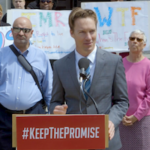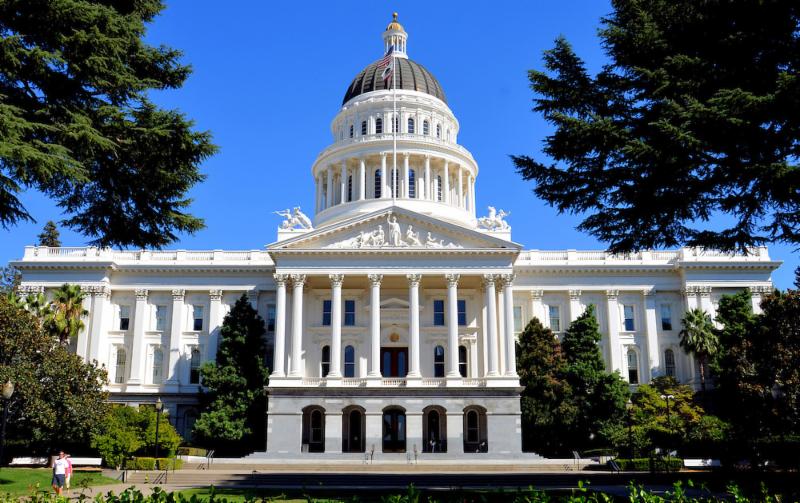June 27th, 2018 – California Governor Jerry Brown signed into law the 2018-19 State Budget. The intellectual and developmental disability community will benefit in two major areas: Investments made to SSI/SSP and special education. The Budget, however, lacks the needed investments into community services and supports. A summary of the impacts this budget will have on the community is below:
Regional Center Services
The budget estimates regional center caseload growth from 317,837 clients to 332,738 clients. The budget includes $330 million increases in regional center purchase of services; of that amount $178.5 million is due to increases in the state minimum wage. Total budget for regional centers is proposed to increase to $6.9 billion in 2018-19 from $6.35 billion in 2017-18. Specific items include:
- $25 million provider rate increase for only one year. Money will be used as a “bridge” to help fund services until a new rate study is released in 2019;
- No restoration of social recreation or camping services (these critical services were eliminated during the recession and advocates have fought hard to restore them and it was approved by both the Assembly and Senate, but it was eliminated in last minute negotiations with the Governor);
- Implementation of the 14-day mandatory furlough schedule will be delayed for one year;
- Half-day billing (essentially a cut to provider reimbursement rates) could be implemented for a loss of $1.4 million (this statute has existed since it was enacted in 2009; however, due to The Arc California’s lawsuit the state has not recently enforced it. The Governor’s budget did not suggest that they would begin to enforce it again but it could be possible that they would try);
- $200,000 increase to provide supplemental payments to ICF-DDs consistent with a corresponding Medi-Cal rate increase;
- $300,000 increase to Kern regional center for management oversight and accountability;
- $1.5 million for Best Buddies program;
- Requires each regional center to include on its Internet Web site any procedures and assessment tools used by the regional center to determine the level of respite services needed by each consumer (this is in response to last year’s budget change which removed the cap on respite services that was enacted in 2009, and reports that some regional centers are not updating their respite policies as a result)
Developmental Centers
The number of residents in the remaining developmental centers is projected to decrease to 534 by July 2018, and 323 by June 30, 2019. Sonoma Developmental Center is scheduled to close December, 2018. Overall funding for the developmental centers decreases from $485 million to $385 million, including:
- $10 million for the Department to address deferred maintenance issues at the Porterville developmental center.
SSI/SSP
SSI/SSP recipients received a big win in this year’s Budget. The Budget includes $2.8 billion General Fund for the SSI/SSP program. The average monthly caseload in this program is estimated to be 1.3 million recipients in 2018-19, a slight decrease from the 2017-18 projection. The SSI/SSP caseload consists of 70 percent people with disabilities, 28.6 percent aged, and 1.4 percent blind.
- Effective January 2018, maximum SSI/SSP grant levels are $910 per month for individuals and $1,532 per month for couples. The federal cost of living adjustments based on the current Consumer Price Index growth factors are 2 percent for 2018 and a projected 2.6 percent for 2019. As a result, the maximum SSI/SSP monthly grant levels will increase by approximately $20 and $29 for in- dividuals and couples, respectively, effective January 2019. CAPI benefits are equivalent to SSI/SSP benefits, less $10 per month for individuals and $20 per month for couples.
- SSI/SSP Cashout Repealed – The budget repeals state law that cashed out eligibility for federal SNAP (CalFresh) benefits in exchange for a $10 increase in the SSI/SSP grant amount. By ending cashout beginning in June, 2019, the state will permit SSI recipients to apply for CalFresh. It is estimated that as many as 375,000 SSI recipients may become eligible for CalFresh. Benefit levels will be based on a table developed by DDSS in consultation with stakeholders.
- Transitional Nutrition Benefit (TNB) Program – The budget establishes a second new program to “hold harmless” households that will lose all eligibility for CalFresh due to the end of cashout. CalFresh households which include one or more SSI recipients will now have the SSI income considered when calculating CalFresh eligibility and benefit amounts. It is estimated that over 7,000 house- holds will lose all CalFresh due to the end of cashout. The TNB will provide a monthly supplement to the CalFresh amount so long as the family remains on CalFresh when cashout ends and the SSI recipient remains in the household.
- State Supplemental Payment Cost of Living Adjustment (COLA) – The budget restores the COLA for the state portion of the SSI/SSP grant beginning July 1, 2022 based on the California Necessities Index. The SSP COLA was suspended in 2009 during the recession and only one COLA has been provided since that time.
IHSS
IHSS Provider Paid Sick Leave – The Budget includes $29.9 million General Fund to reflect implementation of eight paid sick leave hours for IHSS providers beginning July 1, 2018. Also, no later than February 1, 2019, would require the State Department of Social Services, in consultation with the Department of Finance and stakeholders, to reconvene the paid sick leave workgroup for in-home supportive services. The bill would require the workgroup to discuss how paid sick leave affects the provision of in-home supportive services and to consider the potential need for a process to cover an in-home supportive services recipient’s authorized hours when a provider should need to utilize his or her sick time. The bill would require the workgroup to finish its work by November 1, 2019.
Healthcare
Home Health Rate Increase – The Budget includes $64.5 million for a 50-percent rate increase and associated increases in utilization for home health providers that provide medically necessary in-home services to children and adults in the fee-for-service system or through home and community-based services waivers.
Dental
The restoration of full dental services for adult beneficiaries in the Medi-Cal program became effective January 1, 2018. This year’s budget includes other major investments that will specifically benefit the special needs community:
- Allowances for Additional Time for Individuals with Special Health Care Needs: Based on stakeholder feedback, dental providers will be reimbursed for additional time needed by individuals with special health care needs. The associated supplemental payment will be 60 percent of the Schedule of Maximum Allowances (SMA).
- Supplemental payment categories include restorative, endodontic, prosthodontic, oral and maxillofacial, adjunctive, and visits and diagnostic services. These payments will be maintained for 2018/19 at 40 percent increase of the SMA.
Special Education
The budget includes several investments into special education funding in California, including funding to recruit and retain special education teachers and capacity building for early care. See The Arc California’s June 25th Monday Morning Memo for detailed information. Approved budget items are below:
- $167.2 million in Proposition 98 funding for the Inclusive Early Education Expansion program. Under this program grants will be provided to local educational agencies (LEAs) to increase access to subsidized early care and education programs for children from ages zero to five.
- $10 million in one-time funding to establish the Inclusive Early Care Pilot Program. Under this program, county offices of education may apply to receive grants to increase access to early care and education programs for children with exceptional needs, including severe disabilities, from ages zero to five.
- $50 million in one-time Proposition 98 funding for teacher residency programs for special education teachers and another $50 million in one-time funding to recruit and retain special education teachers.
Workforce Development
$1.5 million to create a 3-year pilot program in the Counties of Sacramento and Los Angeles for the purposes of increasing long-term employment opportunities for young adults with autism and autism spectrum disorder. The “Breaking Barriers in Employment for Adults with Autism Pilot Program” requires the Workforce Investment Board to (a) Work with an experienced nonprofit organization on the outreach, selection, training, and compensation of young adults with autism to participate in the program.
(b) In collaboration with stakeholders, create a manual to train employers in building workplace capacity for the targeted population. (c) Once the manual is developed implement free employer trainings in Sacramento and Los Angeles counties based on the manual. Eligible uses of pilot program funds include, but are not limited to, stakeholder outreach, student trainings, employer trainings, administrative resources, and stipends for participating young adults.

Jordan Lindsey, Executive Director, The Arc of California

